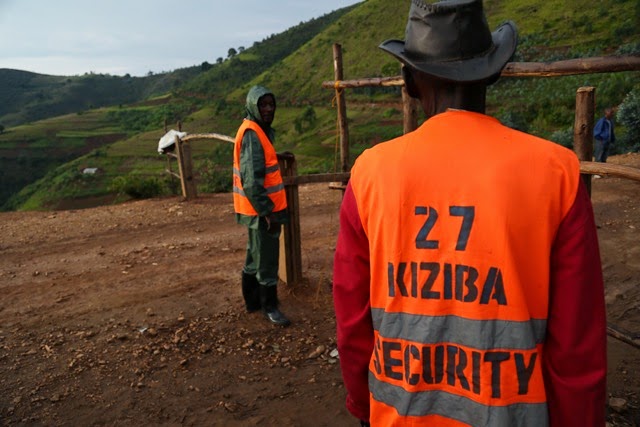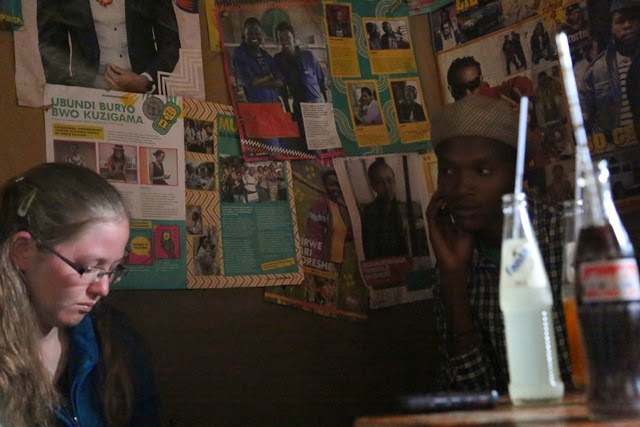Anyone who really knows my Rwanda travels knows I’m a fan of Fanta Citron. It’s only a flavor in Rwanda and Dubai, I think, so even in other parts of Africa you can’t get it. But, I digress…
Last year, while interviewing the Security and Executive Councils in the dark room off the main square, we were instructed to buy everyone sodas for their time. As we shared in a variety of sodas, packaged in battered glass bottles and sipped through plastic straws, we talked about all aspects of the camp and I remember it like it was yesterday. This time, we gathered with the camp youth—those in the 18-24 age range who have basically lived their entire lives inside of this refugee camp. We were interested in their perspective, the understanding of the world outside the camp, and their sense of “home” or national belonging. To treat them for the time they spent with us so late in the day, we sent for sodas and passed them around. I didn’t drink mine, and left it for them to share with someone else later, but we all indulged in a little sweetness while we talked about the bitterness of camp life for youth who have finished all available avenues for education.
 |
| Upgrades to the security at the camp border |
The moral of the story is, no one likes to be bored. When schooling ends at 10th grade, which is an improvement in the last year of two full grades, and there’s no hope of outside employment because of lack of national identity papers, you basically just sit around. “Hope?” they ask. “How can we have hope for the future when we just sit here in this camp?” Some have tried to venture out and seek work. One young man left to pay for the additional food his paralyzed nephew requires. He worked informally as a waiter (under the table) and said they basically just paid him however much and whenever they felt like it, and they didn’t treat him “like a human being.” Not many have tried this route, but it was a powerful message about belonging and mobility. This story of migration transcends the refugee experience and encompasses immigrant workers all over the world, with Mexican migrant workers in the US and Filipina domestic workers in the Middle East coming to mind. They asked us to lobby for more sponsorships for them to continue their studies outside the camp. Finishing grades 11 and 12 to get a high school diploma requires boarding school in neighboring cities—a luxury most cannot afford. Two among them, however, had found sponsorships and finished school, and yet it didn’t seem to get them anywhere. In the end, without legal work papers, there aren’t a lot of opportunities for jobs. So they sit. And wait. For what? They wait for the war in the Congo to end so they can go back and resume the lives of their parents that have been told to them through stories over the years; they wait for that precious letter from the UN to come and tell them they’ve been approved to be resettled in another country—usually the US, Finland, or Australia; they even wait for some generous soul to offer a sponsorship that would allow them to leave and study—anything to break the monotony of sitting around and waiting some more.
As we sat and talked, mostly about earnest things but sometimes about more light-hearted topics, we neared the end of one of the interviews and asked if they had any questions they’d like to ask about us. One young man, the one I think will be camp president one day, asked me why I liked to come to this particular camp. I gave some diplomatic answer about how it’s clean, and safe, and the people are warm and gracious, and of course because we have to come visit the friends we’ve made here. Really, there are a million reasons why this camp is where I come, but I wanted to be brief as the sun was setting and we still needed to shimmy our SUV down the steep slope that leads away from the camp to town. As I reinforced that I was so impressed with how orderly and clean life was here, and my translator was working this all into Kinyarwanda, a huge rat skirted along the curtain top that hung between the room where we all sat and the bedroom. Everyone tried to hold in their laughter, but I burst out in giggles and we all lost it. My poor translator looked around and asked what was the matter, but we were laughing so hard it was difficult to get out the explanation. The rat made his appearance a few more times, but the timing of that couldn’t have been funnier.
 |
| Research and Fanta |
The youth of the camp are well educated. The director of studies at the school, who’s getting ready to depart for his resettlement in the US (where, at the age of 28 he will be the primary breadwinner and responsible adult of 9 of his relatives that are children—probably siblings, nieces, and nephews) informed me that the camp school is the highest performing school in the district, and always does well in national exams. And yet, beyond 10th grade, there’s little opportunity to study. I found among them future camp leaders and philosophers, yearning for the opportunity to spread their wings as any young person does. I’m haunted by the explanation one young man gave to us about what he thought was the main concern of youth in the camp. “You see,” he said, “young people’s minds are like candles. Eventually, without any support, they go out. The world becomes small and you are confined in the way you think.” I noticed this among some of them—without external stimulation they seemed to loose hope and stop looking for ways to expand their minds. As they watched our translator/driver navigate the world between “us” and “them” I saw flickers of candles in that room, intrigued by the notion of the world beyond. I was so impressed by the ways in which they attempted to use their English to listen and communicate with me, even when it was clearly difficult. The desire is there, they just need a little hope to keep the candle burning. I don’t know what I can do for that. I don’t know how to answer the question, “How will you use our stories? How can you help to change this situation? How can you guarantee to us that you will be good ambassadors for our stories?” I don’t know how I can live up to any possible answer I could give to those questions, but I think if I change just one person’s understanding of what life is like in a refugee camp, or alert just one more person to the fact that these people have been sitting here, lives on pause, for over 18 years now, I will have taken some baby steps to honoring my commitments. In the meantime, I’m going to ponder the ways in which one person can make a difference. What is the practical side of academics, where research goes beyond books that sit on dusty shelves to applications that affect the ways in which people live their lives?

so interesting, Erika. about your last paragraph.I read in the last year a lot about 'the white women's burden,' Western/white-centrism of knowledge 'production'/research for example; the white savior woman of the black or brown woman etc. and I wonder a lot about what it all means (or should mean) and what it all actually 'does' (or what it should or could do) to be meaningful….
Exactly, Sabine…it sounds like to me your dissertation is also a book. You already know that you can't save people, at least not the way most Westerners think people can be save, but you can spread stories like wildfire, for sure. Light candles, shit create a book that's an infinite LED light to the world. People need to understand stories, lives, facts, and what hope really is when it comes to how a person gets by, or doesn't in the most unimaginable circumstances. You inspire me every day. You remind me that the world is built, and changed, on and through stories. Thank you.